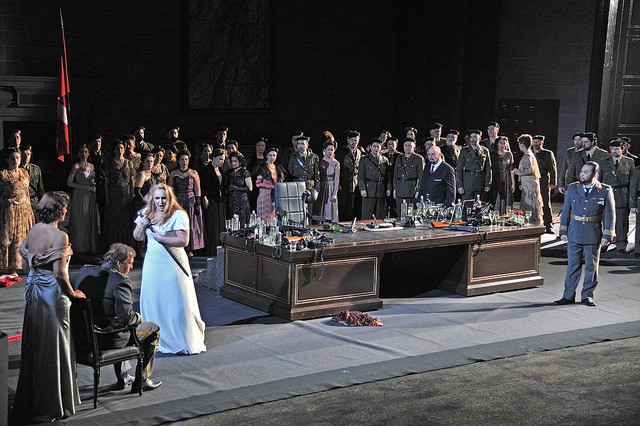 Spain Wagner, Götterdämmerung: Liceu Orchestra and Chorus, Josep Pons (conductor), Gran Theatre del Liceu, Barcelona, 7.3.2016. (JMI)
Spain Wagner, Götterdämmerung: Liceu Orchestra and Chorus, Josep Pons (conductor), Gran Theatre del Liceu, Barcelona, 7.3.2016. (JMI)

Wagner, Götterdämmerung
Cast:
Brünnhilde: Irene Theorin
Siegfried: Lance Ryan
Hagen: Hans-Peter König
Gunther: Samuel Youn
Gutrune/Third Norn: Jacquelyn Wagner
Waltraute: Michaela Schuster
Alberich: Oskar Hillebrandt
First Norn: Cristina Fau
Second Norn: Pilar Vázquez
Woglinde: Isabella Gaudí
Wellgunde: Anna Alàs i Jové
Flosshilde: Marina Pinchuk
Production: Stadt Köln
Direction: Robert Carsen (original), Oliver Klötter (revival)
Sets and Costumes: Patrick Kimmonth
Lighting: Manfred Voss
The Ring of the Nibelung, which has now come to an end in Barcelona, did not on the whole have a particularly brilliant run, although it finished better than it started. This Gotterdammerung maintained a good musical level throughout, with a staging that was the most interesting of the whole cycle and a cast that exhibited lights and shadows.
The Robert Carsen production comes from the Cologne Opera, where it had its premiere in 2000. For me, he is one the most gifted stage directors in modern times, and I always expect the best from him, but the truth is that this production of The Ring has fallen below what I anticipated. There is a guiding concept here, which is the ecological allegation that human selfishness is destroying the planet and making a dunghill of the Rhine. This theme is always present, but I miss those touches of genius that Robert Carsen has made us accustomed to throughout his career.
The sets offer the familiar dunghill in the scene of the Norns, and present the Rock of Brünnhilde on a bare stage. The palace of the Gibichungs consists of a large room with an imposing desk in the middle and two maps of the Rhine in the rear. Siegfried’s arrival takes place here, as well as the entire second act and the final part of third. The scene on the Rhine offers a riverbed full of dirt, while the immolation of Brünnhilde is quite striking: a stage almost darkened by smoke allows for beautiful images of the sacrifice of the former Valkyrie. The action is brought up to modern times, and the lighting is excellent, especially in the last scene. The stage direction is solid, with good movement of the crowds and well-defined characters; it doesn’t seek to be highly original except to place Gunther on the stage for the abduction of Brünnhilde, while Siegfried sings from off-stage.
The musical direction under the baton of Josep Pons was effective if not particularly bright, with lively tempos but some lack of emotion. I found his reading disappointing in the first half of The Ring, but things improved in the last two operas. The orchestra had a serious problem balancing the sections, with the string sound almost hidden by the winds. The chorus did nicely, although I missed more power from them.
Brünnhilde was played by Swedish soprano Irene Theorin, who gave a powerful and convincing performance, although her top notes were invariably shouted. There are very few sopranos today who can cope with this character in Götterdämmerung, unlike the situation in Siegfried. The biggest ovations of the night were for her, with the audience appreciating her virtues and forgetting her shortcomings.
If it is difficult to find a suitable Brünnhilde, the same or more can be said of Siegfried. On top of the lack of adequate interpreters, we now find out that the best of them all, American Stephen Gould, is ill. Here we had Lance Ryan, who for years has been a frequent interpreter of the young Siegfried. Götterdämerung requires a more dramatic tenor, which Lance Ryan is not. In addition, he showed signs of vocal fatigue and, overall, his Siegfried was rather modest.
A more satisfying performance came from Hans Peter König as Hagen. In recent years he has been an authentic reference in the role. His voice is attractive and powerful, and he dominates the character. From my point of view, he is the best Hagen since Matti Salminen.
Samuel Youn was a correct but not particularly bright Gunther, and he fell short on volume at times. For Gutrune, his sister on stage, we had Jacquelyn Wagner, who also sang the Third Norn. From the opening scene I wondered how she would solve the part of Gutrune, as her voice sounded light and too small. And so it was. From my point of view, she was miscast as far as voice is concerned, even if she did well on stage.
Michaela Schuster was good as Waltraute, although I missed more emotion in her singing. Veteran Oskar Hillebrandt was Alberich, and his voice seemed quite tired.
José M. Irurzun
